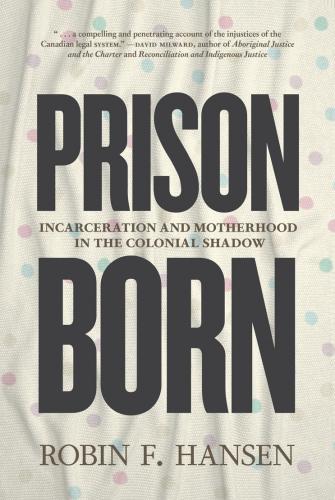A scathing critique of the colonial legal system’s denial of children’s rights
One afternoon in 2016, law professor Robin Hansen receives a call. On the other end of the line is “Jacquie”—a pregnant Indigenous woman, nine weeks from her due date and terrified for the welfare of her unborn son. Jacquie has been sentenced to a custodial prison sentence and her son will be automatically separated from her immediately after his birth.
As Hansen works to help Jacquie with her appeal, she uncovers the legal system’s inherent discrimination against mothers in custody and the children born to them. Using Access to Information requests along with extensive research, Hansen examines the legal rights of these women—the majority of whom are Indigenous—and finds that Jacquie and her son are by no means alone: automatic mother-infant separation without due process remains the norm in most jurisdictions in Canada.
Prison Born calls attention to the colonial and gendered assumptions that continue to underpin the legal system—assumptions that so frequently lead to the violation of the rights and denial of personhood for children and their mothers.
Introduction
PART I. OBSERVATIONS
1. Sentencing the Newborn
2. Automatic Separation in Canada
PART II. THEORY
3. A Systems View of the Legal System
4. The Colonial Lens: Seeing the “Savage” and the “Dying”
5. Case Study: The Stanley Acquittal
PART III. ANALYSIS: SPATIAL DEFINITIONS IN COLONIAL IDEOLOGY
6. The Instrumentalized Stereotype of the Unfit Indigenous Mother
7. Courts as the Gateway to Indigenous Over-Incarceration
8. Prison Wastelands and the Removal of Children
PART IV. ANALYSIS: OTHER ASPECTS OF THE SYSTEM
9. Law through the Androcentric Lens
10. Factors that Buffer the Legal System from Change
PART V. SOLUTIONS
11. The Illegality of Shackling a Pregnant Person in Labour
12. How the Law Protects a Newborn from Automatic Separation from Their Mother 195
Conclusion
Acknowledgements
Appendix A. Canadian Federal/Provincial/Territorial Ministers of Justice (2023)
Bibliography
Notes
Index
“Hansen carefully and patiently walks readers through automatic [mother-infant] separation [in prison]...the writing is accessible and will appeal to readers...it provides a reformist approach, demanding that the law work to protect, not only to punish.” —The Winnipeg Free Press
"As Prison Born spotlights the need for procedural and systemic improvement, it challenges us as individuals to take off our own blindfolds.”—Literary Review of Canada
“A harrowing, nuanced, and deeply important examination of Canada’s judicial and prison systems as they pertain to incarcerated women and their newborns. A must-read for all Canadians.”—Saskatchewan Book Awards Juror Citation
"A penetrating critique of judicial insensitivity towards the concerns surrounding Indigenous incarceration.” —David Milward, author of Aboriginal Justice and the Charter
"Prison Born takes on the harmful state practice of infant separation in the Canadian criminal legal system, with attention to its gendered, racialized, and colonial impacts. Following the story of one woman and her child, born while she was serving her sentence, Robin F. Hansen exposes the brutality and injustice of punishment practices and asks important questions about why and how these practices are normalized." —Debra Parkes, Chair in Feminist Legal Studies, Peter A. Allard School of Law, University of British Columbia
"This book tells the story of ‘Jacquie’ and her newborn son ‘Yuri’ and how the author was able to help to keep the Canadian criminal justice system from brutally separating them. Necessary reading both as a compelling story and as a critique of how the Canadian criminal justice system continues to fail and violate the rights of Indigenous people, women, and their children." —Kent Roach, C.M. and author of Canadian Justice, Indigenous Injustice
"This is an essential and gripping book about the most extraordinary collateral consequence that our sentencing courts impose: the separation of mother and infant through incarceration. It is unconscionable that our legal system has not been pressed into finding a better way. This book will help." —Lisa Kerr, Director of the Criminal Law Group at Queen’s Law

